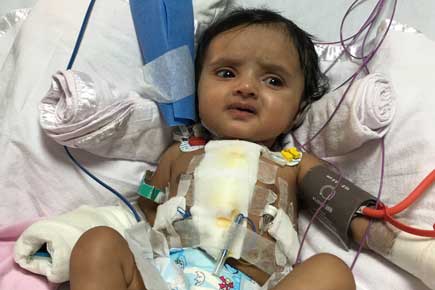Four-month-old Aditi Gilbile, who was suffering from the rare congenital heart disease, undergoes nine-hour operation at Sir HN Reliance Foundation Hospital and is set to be discharged soon

When four-month-old Aditi Gilbile was brought to Mumbai to get treatment for her rare congenital heart disease, she had suffered around 15-20 minor heart attacks, visited more than 10 specialists, and her heart capacity to pump blood had fallen to 15%.
ADVERTISEMENT
Suffering from the rare congenital heart disease, medically termed as Anomalous Left Coronary Artery from Pulmonary Artery (ALCAPA). However, 10 days after undergoing a nine-hour surgery at Sir HN Reliance Foundation Hospital on February 22, Aditi has been pronounced stable by the doctors and is set to be discharged in a day or two.

Four-month-old Aditi Gilbile
Explaining the rare condition, Dr Shivaprakash, Chief Surgeon and Head of Paediatric Heart Centre, HNRF said that the there was a lesion, caused by an abnormal origin of the left coronary artery (the artery that carries blue (impure) blood to the lungs). “In the case of a normal baby, pressures in the lungs normalise seven days after birth. But in Aditi’s case, the lesion diverted the pink (pure) blood, thereby severely reducing the supply of pure blood to the heart. It resulted in the so-called ‘frequent and silent heart attacks’ that damaged the heart muscles,” said Shivprakash.
Born on October 20, 2015, Aditi’s parents, Pramod and Preeti, said that she started showing symptoms of the disease on the tenth day after her birth and they immediately took her to their family doctor.
“She would cry continuously for three hours and sweat profusely. We took her to Dr Chandrakant More, an MBBS peadiatrician, who immediately diagnosed that the baby had irregular blood pumping issues,” said Preeti.
Preeti, who is from a small village as Barshi, in Solapur, said that they decided to take their girl to Pune for treatment. “They said there is only a 5% chance of survival and the cost of the surgery would come up to Rs 6 lakhs. After that we came to know about HNRF and brought her here,” said Pramod.
Dr Shreepal Jain, paediatric cardiologist of RF Hospital, said such children usually die of heart failure before their first birthday. According to him, this defect is extremely rare – one in 300,000 deliveries – and hence, is often missed by doctors. “A simple ECG can diagnose the defect but its usually not picked up early. We did a 2D echo to confirm the defect and immediately decided to operate on the baby the next day,” said Jain.
The surgery lasted nine hours. The artery was disconnected from its abnormal origin, and was reimplanted at its right place in the aorta. The area from where it was harvested was reconstructed with a patch of the tissue covering the baby’s heart.
The doctors also converted the bypass circulation to left heart 30 minutes, so that the weak side of the heart could take the load of the blood circulation gradually. Doctors confirmed that Aditi’s condition stabilised after five days.
“The child’s heart was really weak after surgery, and needed all the medicines, including levosimendan (used only for very poorly functioning heart). Immediate post-operative period is very critical and requires exceptional degree of surveillance,” says Dr Amish Vora, chief of Paediatric Intensive Care and a core member of the team that takes care of babies following congenital heart surgeries.
For three days post-surgery, Aditi had stiff lungs. Thereafter, she started stabilizing, says Dr Vilson, chief of Paediatric Cardiac Anaesthesiology. The baby initially received support for her heart, lungs, and kidneys, but has gradually been weaned off them.
The team of doctors applauded the family members for recognising the importance of the treatment and rushing to the hospital. “Generally in rural areas, a girl child fails to get so much attention and people tend to think the crying of the child as minor issues. But this family, being educated, especially the mother being well versed and educated, realized the need of the hour and rushed the baby to the hospital. It’s a great attempt,” said Dr Shivprakash. On the other hand, when mid-day asked Preeti whom she would give the credit for the baby's successful recovery, she said that the doctors did everything. “We always wanted a girl and never made any difference in a girl and a boy. The doctors only did everything. They are our god,” said Preeti.
 Subscribe today by clicking the link and stay updated with the latest news!" Click here!
Subscribe today by clicking the link and stay updated with the latest news!" Click here!






